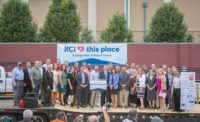Transportation
After Kansas City Council Intervention, KCI Concrete Contract Rebid
Woman-owned firm would have been part of JV initially endorsed by contractor, but St. Joseph, Mo., competitor brought in more small, local, minority-owned firms

This precast wall in the front of KCI Airport's head house had to be erected before precast road-support columns and the roof's steel Y columns because there would be no room to build it once the other structures were in place.
Photo by Jeff Yoders/ENR
The eventual winner of a $72-million concrete contract for the $1.5-billion Kansas City International Airport project said that more minority contractors are benefiting from it being awarded the contract, even though the Federal Aviation Administration last month admonished the city's aviation department for not keeping better records of minority and women-owned business enterprise compliance.
The protest and decision reflect many of the tensions surrounding efforts to award contracts to minority, women and small companies, and how those intermix with tensions over local influence and out-of-town employers.
The single-terminal airport includes 39 gates, a garage, a new dual roadway and other related site improvements.
In August, 2020, the Kansas City Council asked the city’s aviation department not to proceed with the award of a $72-million concrete contract to Denver-based ESCO Construction, Inc. which was partnered with G2 Construction, a Kansas City woman-owned concrete contractor. Its president, Lisa Garney, is the daughter of Kansas City developer Charles Garney.
Several Kansas City Council members said at the August 2020 meeting that their constituents wanted a more fair shot at work on the concrete contract. City Councilwoman Melissa Robinson said at the meeting, “We have to do better with sharing the pie to make sure that minority-owned companies and women-owned companies are able to grow through this project.”
Council members objected to a recommendation by the airport terminal prime joint venture general contractor, Clark Weitz Clarkson, to award the concrete package to the ESCO/G2 group. Council members noted that of the $23 million the ESCO/G2 bid proposed for MWBEs, only $3 million would have gone to minority firms and that $20 million would have gone to G2 Construction whose president, Garney, is white.
'I put my heart and soul into securing this contract.'
Lisa Garney, G2 Construction
ESCO/G2 was never awarded the work and, after more bids were asked for, the city awarded the $72-million contract to Ideker of St. Joseph, Mo., which is about 90 miles from Kansas City. ESCO/G2 had submitted a bid that was $1.5 million lower than that of Ideker, but that company eventually won the contract. Its bid included $23 million for 11 different minority and women-owned business enterprises in its bid, many of them Kansas City-based.
In a Feb. 9 letter from the FAA to the city, the agency said that the city aviation administration had not reported a civil rights and retaliation complaint brought by a woman-owned contractor. The FAA gave Kansas City 30 days to comply with minority business participation requirements or provide a timeline for when corrective actions will be completed.
“We expect the city to take immediate steps to correct the identified deficiencies, starting with proposed corrective actions and timelines for each finding,” the FAA said.
Garney said that her firm should have won the contract and could have completed the work.
“I put my heart and soul into securing this contract and I invested substantial sums to obtain [it] only to have [it] pulled away," she said. "The award would have been a beacon for the inclusion of minorities and women in the project. Instead, the city attacked me as a woman-owned business to steer the contract to a political favorite."
Paul Ideker is president of the Heavy Constructors Association of Greater Kansas City. While Ideker insists that there was no influence exerted in favor of his firm, several local minority-owned firms had said to their Kansas City Council representatives that the $72-milion contract was going to a Denver-based company, ESCO Construction, rather than a local one. In addition, those contractors argued that $20 million of the $23 million earmarked for minority and women-owned businesses in the contract should go to more than just one woman-owned firm.
“The associations here in town and some local contractors wanted to see it go local,” Ideker said. “There was definitely some talk about preferring local contractors.”
Ideker noted that his company’s bid included 11 women-owned business enterprises and minority-owned business enterprises in its bid and “we met the goal” that the city called for regarding minority contractor participation. “All we did was give them numbers,” he said. “We tried to show them that we have the experience to do it and give them our best price, and hopefully all of that works out.”
Tracking of MWBE contract awards
While the FAA's Feb. 9 letter charged that the Aviation Dept. failed to properly track MWBE hiring for the airport project, developer Edgemoor Infrastructure & Real Estate of Bethesda, Md., insists that isn't true. It says that not only has its contractor, Clark Weitz Clarkson, tracked participation, but that information was readily available to the agency from another city department.
Kansas City’s Human Relations Dept. has records of contracts worth $319.8 million, or 21%, of the project’s budget that have been awarded to minority- or women-owned firms. That exceeds the 20% goal set by the city, according to Geoff Stricker, senior managing director of Edgemoor.
In October, HRD changed its name to the Civil Rights and Equal Opportunity Dept. Clark/Weitz/Clark has also developed a workforce training program aimed specifically at minority contractors.
Paul Ideker says his company has achieved its goals for minority- and women-owned business hiring, and that the concrete work has resulted in about 200 jobs for the local building trades.
“We had 11 MBE and WBE subcontractors on our team that were also wanting the work to stay local if possible,” he said.





